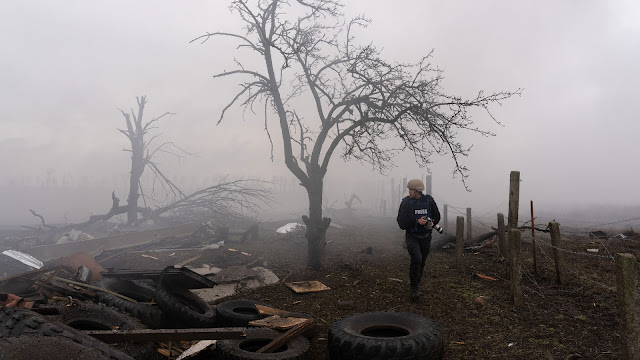20 Days in Mariupol dir. Mstylav Chernov (Audience World Documentary Winner)
by Morgan Stone, Zac Bentz, and Sienna Axe
Morgan: This was the most difficult film I think I have ever seen, but I do firmly believe that it was an important watch. 20 Days in Mariupol documents reporter Mstylav Chernov’s experience in Mariupol, Ukraine when Russia invaded in late February of 2022. What Chernov and the other journalists, Evgeniy Maloletka and Vasilisa Stepanenko, captured during their twenty days in Mariupol is truly harrowing, even more knowing that this is just a fraction of the atrocities that have occurred in Ukraine over the last year. If you do plan on watching this film upon its release, heed the warnings.
Talking about this documentary in the way that I would normally talk about films is impossible. There is no way for me in good conscience to make a judgment on it in comparison to other documentaries. I am sure there are things reviewers have said about the choices of narrative, or how it was edited, because reviewers always do, but I have nothing critical to say within this review. This is a piece of history, and it is truly painful to watch. I don’t see myself revisiting it, but I also don’t think that what I saw is going to leave me any time soon.
Zac: I was speechless after finishing this. Truly one of the most harrowing things i've ever seen in my life, and also so deeply engaging from start to finish. The "days" framing device is extremely effective as we're guided further and further into what feel like the circles of Hell, and the barebones narration adds context to the incredible footage AND grounds it in a first-person experience but never overstays its welcome or detracts from any of the other elements.
It's fascinating to see various civilians' responses to the presence of the camera as well -- there are moments of such intense, unbearable pain that make you wonder if the camera should really be rolling, but not a single moment of this feels exploitative or unnecessary in context. It's incredible how quickly this gets going (the first bombs hit an HOUR after they arrived in Mariupol), and it's just a slow descent into the apocalypse from there. Ultimately this is such a vital piece of filmmaking, because it's one thing to be fed a narrative of war from afar, but its another thing entirely to actually be placed into what feels like the end of the world.
Sienna: Something that struck me about this was how well it engaged with the question of whether or not to film, usually through its subjects. As the situation worsens, you can see the shift: from the distressed woman they wonder if they should film at the beginning, to the Ukranian soldiers outside a hospital asking them to put their cameras away, to eventually doctors begging them to film the horrific conditions the war has forced them to operate under. And it's all so horrifying; multiple times, I had to look away from the screen to collect myself. But as the film says: "This is painful. This is painful to watch. But it must be painful to watch." The civilians asking the filmmakers to keep their cameras rolling, as there was no internet—no way to communicate to the rest of the world just how awful it had become—only reinforces how necessary this film was to make, and how necessary it is for the rest of us to watch.


Comments
Post a Comment